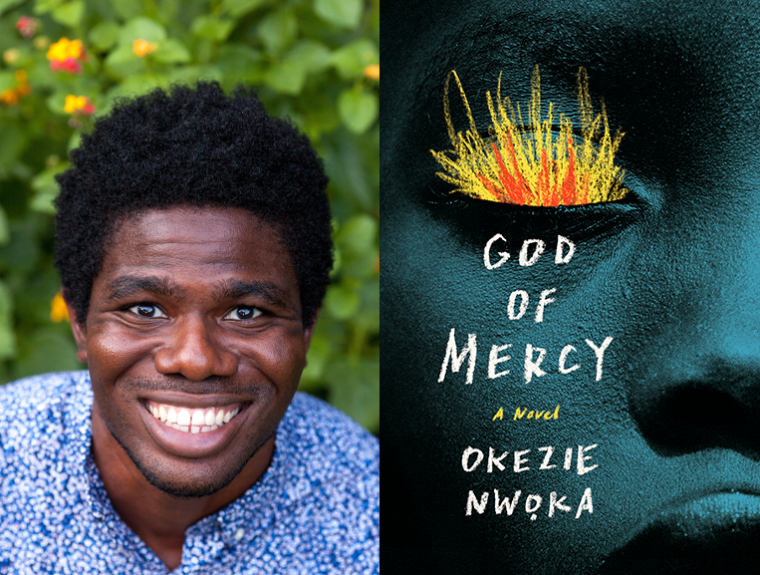This week’s installment of Ten Questions features Okezie Nwọka, whose debut novel, God of Mercy, is out today from Astra House. At the heart of God of Mercy is a girl named Ijeoma, who at age nine develops the ability to fly. Mute for nearly her entire life, Ijeoma has always stood out in Ichulu, the Igbo village she calls home, but her new skill raises special concern. Ichulu is a pious place that, unlike many of its neighbors, has managed to ward off colonizers and hold onto its own Igbo gods—and it is decided that Ijeoma’s miraculous power is a signal that these gods are at war. Immersing readers in the community and venturing outside its bounds, Nwọka poses unique questions about faith and colonialism. “God of Mercy is a profound exploration of religion, faith, and compassion from a gifted storyteller,” writes Maisy Card. “Okezie Nwọka creates a richly imagined postcolonial landscape that is at once otherworldly, tragically human, and completely unforgettable.” Okezie Nwọka (he/they) was born and raised in Washington, D.C. They are a graduate of Brown University and attended the Iowa Writers’ Workshop as a Dean’s Graduate Research Fellow.

Okezie Nwọka, author of God of Mercy. (Credit: Jovan Julien)
1. How long did it take you to write God of Mercy?
From start to finish, God of Mercy took me about eight years to write. I started writing it in college and worked on it intensely in graduate school. And then when I started working after graduate school, I quit my full-time job to complete the novel.
2. What was the most challenging thing about writing the book?
I think the most challenging thing about writing God of Mercy was translating Igbo into English. I wanted the English that I used to have an Igbo character so I spent a lot of time rehashing dialogue to make sure that Igbo was present in it. I also used an Igbo dictionary to include diacritics in the Igbo words so that they could be as grammatically correct as possible.
3. Where, when, and how often do you write?
During my writing seasons I write six days a week very early in the morning before work. I’m a working artist so my biggest challenge right now is writing fiction while maintaining a full-time job. I write at the desk in my bedroom. I find it convenient because after getting up from bed I just roll up to my desk and start working.
4. What are you reading right now?
I just started reading The Prophets by Robert Jones Jr. and am loving it.
5. Which author, in your opinion, deserves wider recognition?
What a fantastic question. I think Okey Ndibe is one of the finest writers coming out of the African/Black diaspora. He is an incredible creator and is one of my heroes in fiction.
6. What is one thing you might change about the writing community or publishing industry?
I wish the writing community would become more diverse in its thinking. Sometimes it feels as though people believe that only white liberals read fiction and this isn’t true at all. Writing is universal. Storytelling, according to Ben Okri, is one of our oldest technologies. I think when we fully embrace the idea that all of us belong to the writing community, things will get better.
7. What is one thing that surprised you during the writing of God of Mercy?
One thing that surprised me in writing God of Mercy was discovering how resilient we humans are in holding onto our beliefs. Here I was writing about this little Igbo village that was about to change its very way of understanding reality, and it hit me that it was going to take multiple supernatural events to allow that to happen. It begs the question: What does it take for any of us to change our core beliefs? I’ve come to find that sometimes it takes the entire world being turned on its head for that to happen.
8. What trait do you most value in your editor (or agent)?
My editor, Danny Vazquez, is one of the most amazing human beings you will meet in this day and age. He just understands liberation, and it is the most refreshing thing I could’ve asked for as a writer. The same is true of my agent, Ross Harris, who is just a vibrant bundle of wokeness. Ross understood what I was doing on the page and believed in it immediately. Both he and Danny are gems in the literary community. I am so fortunate to be working with them.
9. Who is your most trusted reader of your work and why?
My most trusted readers are my siblings Jovan Julien and Chijioge “Chi” Nwogu. They have read all my long-form fiction and I trust their opinions on everything. There is also so much love in our relationships, such that when they are reading me, they are reading as generously as possible, which I always appreciate.
10. What’s the best piece of writing advice you’ve ever heard?
“Keep moving forward.” A colleague of mine at the Iowa Writers’ Workshop, Casey Walker, gave me that advice and I think it is the best I’ve gotten. There are so many obstacles that come with writing. The key is to not lose focus on the goal and to persevere.








